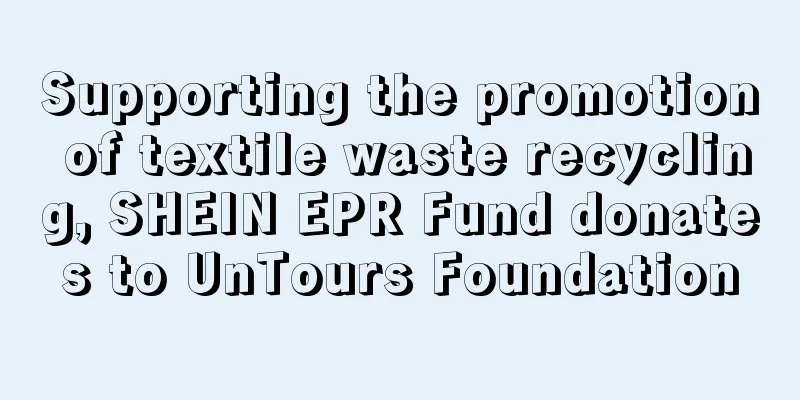Supporting the promotion of textile waste recycling, SHEIN EPR Fund donates to UnTours Foundation

|
Recently, the SHEIN EPR ( Extended Producer Responsibility ) Fund, an important initiative of SHEIN to solve global textile waste management and develop a circular economy , officially selected the UnTours Foundation as its second grantee to support the promotion of textile waste recycling. This is also the latest action of SHEIN to practice green new quality productivity and promote sustainable development of the entire business process. The UnTours Foundation is a nonprofit organization that uses donated funds to provide a revolving loan fund to companies that solve social, economic and environmental problems around the world. SHEIN's donation to the UnTours Foundation will be allocated to an initiative in Cambodia that supports local artisans in recreating products using recycled textile waste. In 2022, SHEIN announced the Or Foundation as the first grantee of the EPR Fund, supporting the expansion of its business activities to benefit the communities around Kantamanto Market in Accra, Ghana , one of the world's largest second-hand clothing markets . Over the past year, the Or Foundation has distributed funds and in-kind donations to 1,334 members of the Kantamanto Market community through the Second-Hand Solidarity Fund , and provided funding to 30 alliance organizations to address textile waste in Ghana, Kenya, Uganda and Nigeria. Through textile innovation in Ghana, more than 35 tons of clothing waste have been reused to produce home and clothing products, and more than 130 tons of textile and other plastic waste have been removed from Accra beaches . In recent years, as the fashion apparel industry accelerates its green transformation, major fashion companies are taking win-win cooperation and long-term development as their guide to open up a greener and more sustainable future for the entire industry. Recycling and reusing waste materials and promoting a circular economy are important attempts. According to data from the Ellen MacArthur Foundation, if 1% of textiles currently sent to landfills are recycled, up to 6 million tons of carbon dioxide emissions can be reduced each year. Elizabeth Killough, Co-CEO of the UnTours Foundation , said: “We are very eager to help solve the global textile waste problem through our partnership with SHEIN. Countries like Cambodia face challenges in dealing with textile waste. They import a lot of textile materials and then make finished products to export to the United States and Europe, but they don’t have the infrastructure to recycle (waste). We are excited to support organizations that are focused on providing solutions at every stage of the clothing production process, helping them move towards a more sustainable future and achieving lasting change in Cambodia and beyond.” In addition to the continuous exploration of textile waste recycling and innovation with partners through the EPR Fund, SHEIN's recently launched "SHEIN X Rescued" series of clothing also purchases excess fabrics from the industry and reuses and creates fabrics through sustainable production. This series of clothing must also meet the requirements of SHEIN's sustainable clothing standard evoluSHEIN by Design, that is, the clothing fabrics contain at least 30% recycled and regenerated preferred materials, the manufacturer must obtain responsible procurement management verification, follow the flexible supply chain model of on-demand production, and finally be packaged with recycled plastics and other materials for shipment. Through such attempts, SHEIN has saved fabrics that were originally destined for waste from entering landfills and given them the opportunity to be remanufactured and sold. According to an assessment by the sustainable fashion company Queen of Raw, SHEIN has reused 19,927 meters of high-quality industry excess fabrics for reproduction in 2023, and through this move has saved more than 150,000 cubic meters of water consumption (approximately equivalent to 300 million bottles of 500 ml bottled water), reduced 3,051 kilograms of chemical waste and 28.94 metric tons of carbon dioxide equivalent emissions. SHEIN has always used innovative on-demand production and flexible supply chain models, used digital tools to analyze and track fashion trends in real time, and used actual market demand to predict sales and control production, effectively reducing inventory and waste, forming an outstanding cost-effectiveness advantage, and also promoting the transformation and upgrading of the traditional textile industry. In addition, SHEIN promotes a sustainable strategy throughout the product life cycle and process, from the use of environmentally friendly raw materials to the entire life cycle process of research and development, production, manufacturing, logistics, and recirculation, deeply embedding green development in all aspects of production and operation, continuously practicing green new quality productivity, and committed to achieving a fully recyclable vision by 2050. SHEIN EPR Fund |
<<: Big seller is hiring with a monthly salary of 20,000! This position is in great demand
>>: Passed important certification! Temu's overseas expansion has taken another step forward
Recommend
Ali International Station overseas buyers form a group to check in at Chinese factories: Digitalization is the biggest trend in China's foreign trade
In recent days, Brandon , a US-based buyer on Ali...
Southeast Asia's e-commerce is growing rapidly and is expected to surpass the UK in the future!
According to foreign media reports , in 2020 , th...
What is Moneta.ru? Moneta.ru Review, Features
<span data-docs-delta="[[20,{"gallery"...
Another platform service is launched to help sellers become hands-off shopkeepers
In the entire process of cross-border e-commerce ...
What is TenTree? TenTree Review, Features
TenTree was founded in 2012 as an outdoor clothing...
Dunhuang.com is recruiting cross-border logistics service providers to join us. From September onwards, merchants can only ship through certified routes.
Recently, DHgate announced that it will vigorousl...
What is U-Tone International Logistics? U-Tone International Logistics Review, Features
U-LOT International Logistics is a professional co...
What is Bunnings PowerPass? Bunnings PowerPass Review, Features
Bunnings PowerPass is a trade account for GST regi...
What is Sequoia Capital? Sequoia Capital Review, Features
Sequoia Capital is a venture capital firm founded...
What is Ravenosaurus? Ravenosaurus Review, Features
Founded in July 2015 and headquartered in Shanghai...
What is Zero? Zero Review, Features
Zero Quit Smoking with a Plan That's Right for...
After the account was blocked, the hot-selling products in Shenzhen appeared in the claw machine
Recently, the number of sellers who need to clear...
Monthly search volume reaches 110 million! AliExpress Russian traffic breaks record
According to the latest data from AliExpress Russ...
Sales of beauty and health products in Russia increased by 16%
As Russia's epidemic control measures are gra...
Australian holiday spending to reach $240 billion? Travel products recover
Australians are likely to spend $240 billion arou...









